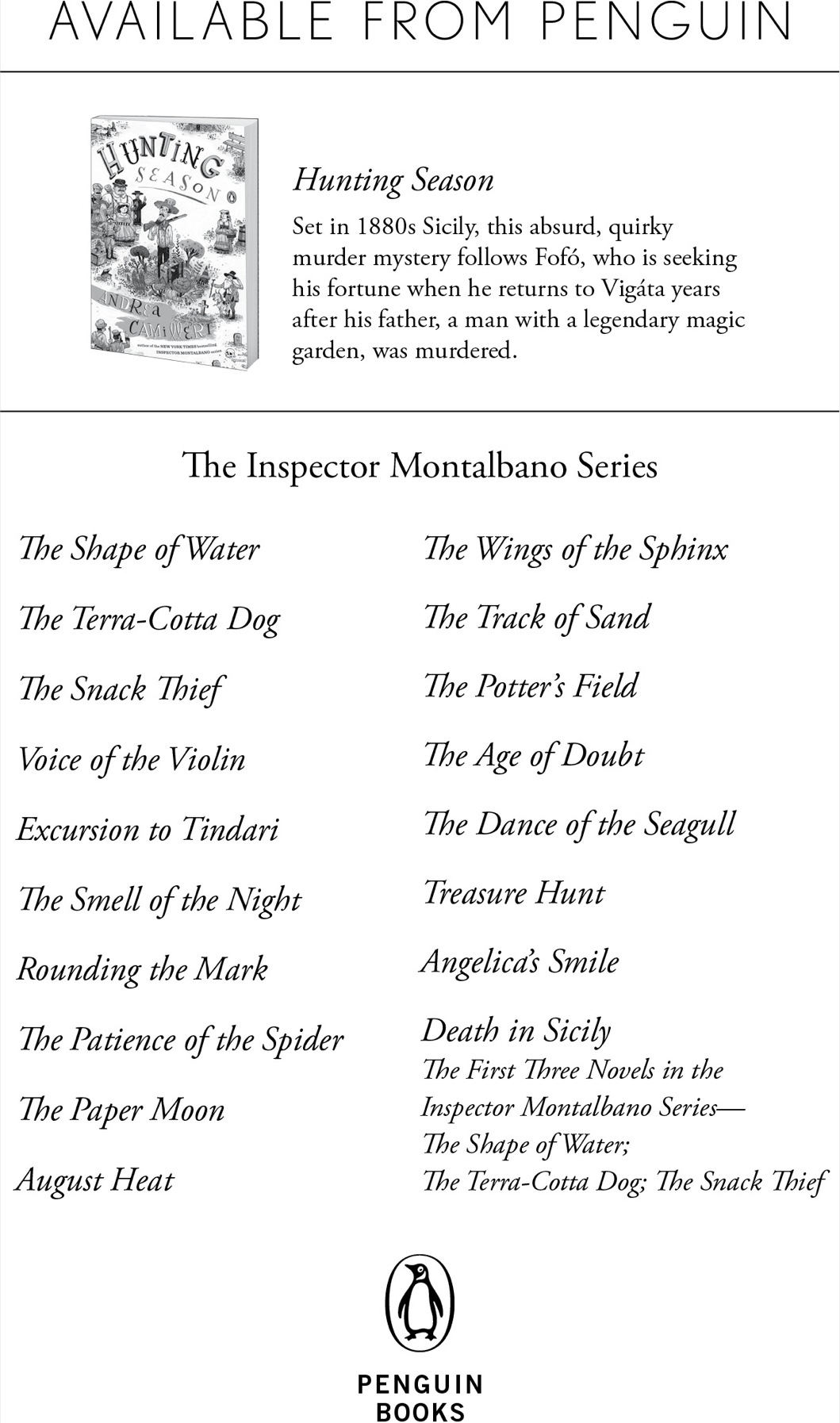The Brewer of Preston (26 page)
Read The Brewer of Preston Online
Authors: Andrea Camilleri

“
Madonna 'amiciaia”
:
“Shirt-making Madonna.” Another instance of the Tuscan elision of the hard “c” between vowels. Normally the word would be
camiciaia
. See note to page 32 on page 239.
“
tanger
 . . . Ãtagère”
:
In the Sicilian dialect of the region of Agrigento (where Camilleri sets his story), the word
tanger
, derived from the French
étagère
, is used for a variety of furnishings that range from sets of shelves to pieces that combine shelves and cabinets. In the present case, it would appear to be the latter form that is referred to.
The wind rose from the west
:
An echo of the
incipit
of
Manalive
(1912), by G. K. Chesterton: “A wind sprang high in the west . . .”
In endeavoring to describe the truly painful events that have occasioned such damage and unrest in the town of Vigà ta
:
Cf. Dostoyevsky,
The Possessed
(1871), which begins: “In undertaking to describe the recent and strange incidents in our town . . .”
“Oh, what a beautiful day!”
:
Slight variation on the opening line of the poem
L'è el dì di Mort, alegher!
(1932), by Milanese dialect poet Delio Tessa (1886â1939): “My, what a beautiful day!”
And how are your horns?
:
A reference to the fact that the commissioner's wife is cheating on him, making him a cornuto.
tresette
 . . . briscola
:
Italian card games.
And it's a good thing
, thought Salamone,
that your horns don't yet reach the chandelier
:
See note to p. 141.
How much longer is this going to last?
:
The opening to Arthur Schnitzler's novella
None but the Brave
(
Leutnant Gustl
) (1901).
I am an elementary school teacher
:
The opening to
Il maestro di Vigevano
(1962), a novel by Lucio Mastronardi (1930â1979). The book was made into a film with the same title, by Elio Petri, in 1963.
field watcher
:
In Sicily, major landowners often resorted to the use of private guards, called
campieri
, to protect their lands and crops from bandits. They were also used as strongmen and avengers. As mentioned in the text that follows, it is only the latter purpose to which this man is put in this case.
Fannu tutte accussì
by a certain Mozzat
 . . .
U flautu magicu
:
With a hilarious touch appreciable perhaps only to Italian ears, Camilleri has his character Sicilianize the Italian titles of the Mozart operas
Così Fan Tutte
and
The Magic Flute
, which would be
Il Flauto Magico
in proper Italian.
An ordinary-looking young man
:
An echo of the opening of
The Magic
Mountain,
by Thomas Mann: “An unassuming young man . . .” (translated by H. T. Lowe-Porter, 1924).
If on a winter's night already
:
A send-up of the opening line and title of
If on a Winter's Night a Traveler
, by Italo Calvino (1981).
It was a pleasure to set the fire
:
A variation on the opening of
Fahrenheit 451
(1953)
,
by Ray Bradbury: “It was a pleasure to burn . . .”
Giagia my dear
:
A direct quote of the opening of
Anime e nudo
, a play by Marco Praga (1862â1929).
Aleardi, the poet over whose pages, in the years that followed, we were to weep so many tears, heave so many sighs
:
Aleardo Aleardi (1812â1878), a late-Romantic poet of aristocratic birth who was known mostly for his high-blown eloquence in celebration of civic values. One of his more famous pieces is called
Il matrimonio
(1842), which celebrates marriage as civic virtue. It is with tongue firmly in cheek that Camilleri makes Aleardi Prefect Bortuzzi's favorite poet.
The oranges were more plentiful than usual that year
:
A direct quote of the opening of
Clea
(1965), by Lawrence Durrell.
“the difference between a common bully and a man of honor”
:
In the common ethos of the “old Mafia,” a “man of honor” is indeed a mafioso. But, as the term implies, the mafioso was held to a code of honor that implied, among other things, no harming of women and children, and no arbitrary violence against personal enemies. Violation of this code could lead to elimination by one's peers. Obviously this code is now a thing of the past, though some of the elder members of the current Sicilian Mafia still use the term “man of honor” to mean a member of la Cosa Nostra.
Notes by Stephen Sartarelli

1
Idiot.
2
Bottom, bum.
3
Asshole.
4
Fuck off; get stuffed.
Looking for more?
Visit Penguin.com for more about this author and a complete list of their books.
Discover your next great read!
